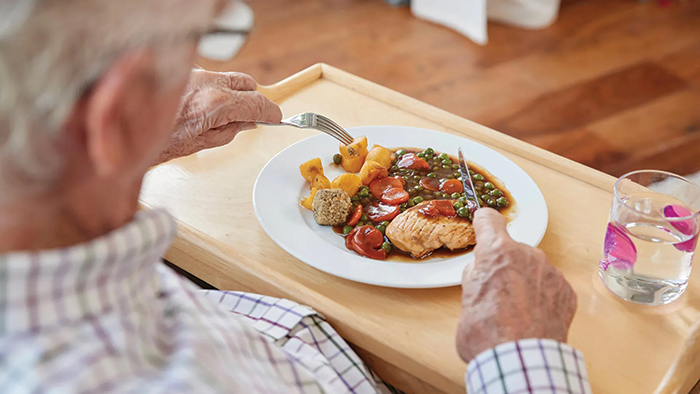Gally, people over 65 years of age are considered senior citizens. They are a useful part of our society and have served in every walk of life. The increased rate of population has a severe effect on a higher proportion of elderly people. For many, aging leads to decreased physical activity and breakdown and thereby changes the nutritional requirements of older adults in a negative manner. This article will look deeply into their nutritional needs and deficiencies.
Causes and Effects of Senior Malnutrition
Malnutrition is the deficiencies or excesses in nutrient intake, protein discrepancy, or reduced nutrient utilization. It causes mental health issues, lack of social interactions, digestive disorders and stomach conditions. Moreover, it also weakens the immune system which can increase the risk of infections. Malnutrition also has a devastating effect on bone mass and causes muscle weakness, which can lead to falls and fractures.
 People of advanced age are at increased risk for diseases and are most likely to be at nutritional risk, as well. However, the cause of malnutrition is complex and multifactorial and malnutrition in the elderly is also triggered by aging processes and certain chronic conditions put them at higher risk. Cancer, diabetes and other conditions can impact appetite, make eating difficult, change metabolism and necessitate dietary restrictions. Disturbingly, the increased healthcare costs in the U.S. for disease-associated malnutrition in older adults is more than $51 billion each year. One study shows that over 65 percent of older adults are hospitalized due to malnutrition and about 16 percent of older Americans consume fewer than 1,000 calories per day.
People of advanced age are at increased risk for diseases and are most likely to be at nutritional risk, as well. However, the cause of malnutrition is complex and multifactorial and malnutrition in the elderly is also triggered by aging processes and certain chronic conditions put them at higher risk. Cancer, diabetes and other conditions can impact appetite, make eating difficult, change metabolism and necessitate dietary restrictions. Disturbingly, the increased healthcare costs in the U.S. for disease-associated malnutrition in older adults is more than $51 billion each year. One study shows that over 65 percent of older adults are hospitalized due to malnutrition and about 16 percent of older Americans consume fewer than 1,000 calories per day.
Quality is Key
It is a sad reality: having a pizza or burger delivered to your home is easier and faster than getting an ambulance in a medical emergency. We know that the majority of fast food and soft drinks contain high amounts of refined flour, sugar and artificial chemicals; they also lose many useful nutrients during processing and their nutritional value is typically low. Even with the knowledge that easy access to unhealthy food can be fatal, we do not pay any heed to it. Junk food may be cheaper, but we are getting it at the expense of our health. In the fight against malnutrition, awareness is essential to prevail.
Must-Eat Foods for Seniors
 Nutritional supplements – pills or powders – are generally considered as vital to mitigating malnutrition. However, supplements make a lot of claims and medical researchers have yet to prove their effectiveness. Instead, seniors need to consume a healthy and balanced diet.
Nutritional supplements – pills or powders – are generally considered as vital to mitigating malnutrition. However, supplements make a lot of claims and medical researchers have yet to prove their effectiveness. Instead, seniors need to consume a healthy and balanced diet.
The best way to get the most energy from food is to make sure it is the best food possible. Fresh, seasonal fruits and vegetables provide us with every protein and energy we need, as well as antioxidants that prevent diseases. The vitamin C content in fresh fruits and vegetables is higher and can reduce the risk of many infections caused by the preservatives used in canned and processed food.
Leaner meats like chicken, turkey and fish provide quality protein but contain less saturated fat. Fish is rich in omega-3 fatty acids and can add beneficial heart-healthy fats to the diet. Similarly, whole grain foods and complex carbohydrates give maximum benefits and add beneficial fiber to our diet. Walnuts and seeds are some of the best sources of nutrients and energy.
 Most importantly, drinking water is bread and butter for optimal body function. It helps in facilitating the body’s energetic processes. “An apple a day keeps the doctor away” is a famous saying indicating fruits are also very important in raising health standards. They contain potassium, fiber, vitamins and the perfect amount of carbohydrates that provide us with a big boost of natural energy.
Most importantly, drinking water is bread and butter for optimal body function. It helps in facilitating the body’s energetic processes. “An apple a day keeps the doctor away” is a famous saying indicating fruits are also very important in raising health standards. They contain potassium, fiber, vitamins and the perfect amount of carbohydrates that provide us with a big boost of natural energy.
One study shows that over 65 percent of older adults are hospitalized due to malnutrition and about 16 percent of older Americans consume fewer than 1,000 calories per day.
A problem not limited to a single country, addressing malnutrition will require global initiatives to get focused on improving access to nutrition, involvement and education that lead to healthier populations. Expert-level meetings are needed to share best practices and the latest trends in nutrition as part of a collaborative effort to address challenges in growth and nutrition.
Research can play a vital role in helping us better understand nutrition’s impact on health outcomes. Furthermore, studies are to be conducted on a grassroots level to find the major causes of unwellness among the elderly. Special training and education can be provided to paramedical staff to create malnutrition care centers that discourage a heavy influx of malnutrition patients into hospitals.
Older citizens have given their youth and energies for our better tomorrow. We may need to work together for their improved health, offering them a longer life expectancy and thus ensuring a healthy and happy society.








